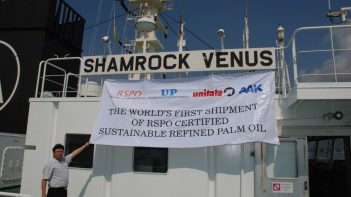Rampant deforestation resulting from growing demand for commodities such as coffee, meat, palm oil and soy has become a key contributor to global climate change, according to a growing number of experts.
The question we must now answer is what role the European Union (EU) – as the world’s largest economy – should be playing to bring an end to imported deforestation. If we are to live up to our commitments without putting food security at risk this must be through sustainable agriculture.
Together, the 28 EU member states account for 16% of the world’s imports and exports of goods and services, including agricultural commodities. The economic block is the world’s largest importer of wood products, soy and coffee worldwide and the third largest importer of palm oil after China and India.
Across the globe, forests are cleared to meet Europe’s demand for these and other products. Despite bringing wealth and economic benefits to producing countries, there are untold costs caused by intensifying the climate change challenge. European consumers are beginning to recognise that the consumption of goods creates a massive environmental footprint and that we have a responsibility to limit that footprint – which extends well beyond Europe’s borders.
At the Roundtable on Sustainable Palm Oil (RSPO), we believe that achieving 100% certified sustainable palm oil (CSPO) in Europe is a realistic ambition, and a commitment that European governments should support.
If we are to deliver on this goal, however, we cannot rely solely on the commitments of RSPO and its members – including some of the world’s leading food manufacturers – to source 100% CSPO. Many organisations across different industries have yet to make a similar commitment. Support from political leaders, including EU policy-makers, to encourage and enable this transition is essential. And while we must engage more openly with civil society and consumers, we must also encourage a closer dialogue between producing and importing countries.
Political leaders can help us share the ambition of a Europe which consumes only CSPO. In December 2015, governments of UK, Germany, Netherlands and Denmark signed the Amsterdam Declaration in support of a fully sustainable palm oil chain by 2020 and more must surely follow. Meanwhile the European Commission has commissioned a review into possible policy options to end embedded deforestation in agro-commodities and has just published an independent evaluation of the EU tropical timber policies.
If we are to meet our Paris Commitments then sustainable agriculture and sustainable palm oil must become the norm. RSPO seeks to promote an open discussion on the policy options needed to address this issue.
Hear more about this topic at our European Roundtable conference in Milan on 8-9 June. Don’t miss out, book your ticket today.
Keep reading

RSPO hosts first Africa downstream sustainable palm oil supply chain forum in Cape Town

Nearly two decades on, Europe continues to drive global demand for RSPO Certified Palm Oil

Communicating Sustainable Palm Oil - examples of success across Europe
[EOT] Terms of Reference: Independent Smallholders Outreach Programme in Indonesia

RT2023 Delegates Propose Solutions to Reinforce RSPO’s Assurance System – End-Year Highlights of Assurance Standing Committee
RSPO UK Members' Day Examines Shifting Dynamics of Doing Business within Europe

Celebrating 20 Years of RSPO’s Sustainability Journey




